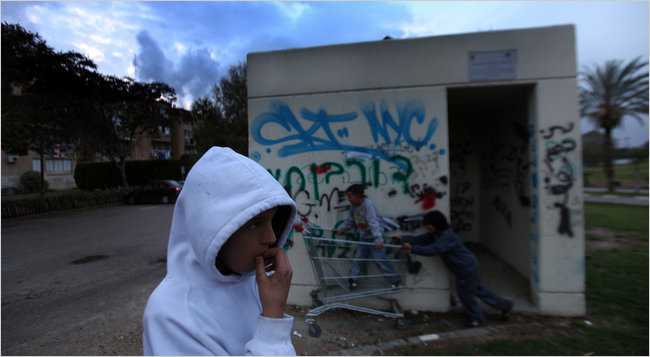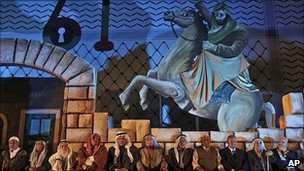By ETHAN BRONNER

JERUSALEM — On one side were members of the Israeli Parliament and advocates who argued that there was only one legitimate way to support Israel from abroad — unconditionally. On the other were those who insisted that love and devotion did not mean withholding criticism.
For an electric two hours on Wednesday, the sides fought bitterly inside a parliamentary hearing room. As they spoke, tensions on the Gaza border rose and turmoil spread across the Middle East; hours later a bomb went off in Jerusalem, killing one person and wounding dozens. Israelis are feeling increasingly insecure about any criticism they believe could help their enemies.
At the center of the parliamentary debate was a three-year-old American advocacy group, J Street, which calls itself pro-Israel and pro-peace, a left-leaning alternative to the American Israel Public Affairs Committee, or Aipac, the pro-Israel lobbying group in the United States. J Street opposes Israeli settlements in the West Bank and urged President Obama not to veto an antisettlement resolution in the United Nations Security Council recently.
The conveners of Wednesday’s hearing, a hawkish Likud legislator named Danny Danon and a conservative colleague from the centrist Kadima party, Otniel Schneller, wanted to expose J Street for what they believed it to be — a group of self-doubting American Jews more worried about what their neighbors say than what is good for the state of Israel.
“This is a dispute between those who care what non-Jews will say and those who believe in being a light unto nations, between the mentality of exile and that of redemption,” Mr. Schneller said. “J Street is not a Zionist organization. It offers love with strings attached. They say, ‘We love you only if you behave the way we like.’ ”
Jeremy Ben-Ami, J Street’s founder, came from Washington to defend his group, which claims about 170,000 supporters.
“We should work through our differences with respect, vibrant discussion and open dialogue,” he told the legislators. “It only weakens Israel and the Jewish people to make differences of opinion into something greater and to accuse those who criticize Israeli policy of being anti-Israel or worse.”
The committee meeting, which drew a crowd and often descended into shouting matches, was unprecedented, according to many Israelis. No one could recall a debate inside Israel’s Parliament examining whether an American group calling itself pro-Israel was living up to the name.
But another parliamentary committee hearing is planned on a similar topic — whether the foreign news media are covering Israel fairly. The focus of that debate will be a comparison of news media coverage of the recent killings of five members of a settler family with the coverage of the Israeli takeover last year of a Gaza-bound flotilla in which nine activists were killed by commandos.
Both hearings are part of a larger trend in this year’s Parliament — a turn rightward. Two laws passed this week have been widely condemned by civil liberty groups and advocates on the left. The first is known as “the Nakba bill,” in reference to the Arabic word for “catastrophe” commonly used by Arabs to describe the birth of Israel in 1948. Arabs who are Israeli citizens often commemorate Israeli independence by noting their losses — the destruction of hundreds of villages and the exile of hundreds of thousands of Palestinians.
The new law allows the Finance Ministry to remove funds from municipalities or groups if they commemorate Independence Day here as a day of mourning or reject Israel as a Jewish and democratic state. The original bill, which produced much alarm and was altered, would have imposed prison sentences.
The second new law that has drawn criticism from the left establishes admissions committees for small communities in the Negev and Galilee, areas with large Arab populations. The new law says that communities with 400 or fewer families may set up committees to screen potential residents for whether they fit in socially. At the last minute, a rider was added barring discrimination based on race, gender or nationality, but critics contend it will still serve to keep Arabs out of Jewish communities.
It is precisely such developments in Israel that J Street leaders say are driving many American Jews, especially younger ones, from devotion to Israel. Therefore, they say, J Street has a vital role in advocating its views here and in bridging the gap between liberal American Jews and an increasingly nationalistic Israeli society.
David Gilo, who is the chairman of J Street, said in the hearing that the contract that had long existed between Israel and Jews abroad — one of unconditional support — was expiring and a new one was being drafted. He argued that the new contract was good not only for those abroad but for Israel as well, since it would bring into the fold those who would otherwise be alienated. “The new contract cannot be based on unilateral dictation of what is right, who is right and who is wrong,” he said. “Only agreement on common values and a genuine attempt to understand where each party comes from can reinstate an Israeli-American Jewish partnership.”
Nachman Shai, a member of Parliament from Kadima, said at the hearing that J Street represented an important part of American Jewry, and that Israel should not turn a blind eye to it.
Shlomo Avineri, a political scientist at Hebrew University who did not attend the hearing, said J Street was in a problematic position because “it is very difficult to be an advocacy group while criticizing the subject of your advocacy. It is difficult to say we are the greatest supporters of Israel but on every issue that arises we are on the other side.”
He added that the extreme right in Israel had always insisted that criticism of Israeli policy was unpatriotic. Now, the extreme right has more power than ever in the country’s history, he said, giving its views a greater platform.
Mr. Danon, the Likud chairman of the committee holding the hearing, said he would put to a vote in the coming two weeks a resolution calling J Street pro-Palestinian, asking it to “purge from its ranks” anti-Zionist elements and urging Israeli government officials to refrain from contact with it.
Prime Minister Benjamin Netanyahu has consistently refused to meet with J Street officials.
Mr. Ben-Ami of J Street said afterward: “This is a time of real uncertainty and threat in Israel, and what we saw at the hearing is part of a larger trend of Israel turning in on itself. It is redefining who is a Jew, redefining who is a citizen and now redefining who is a friend.”
www.nytimes.com, 24 March 2011
More on J Street:

